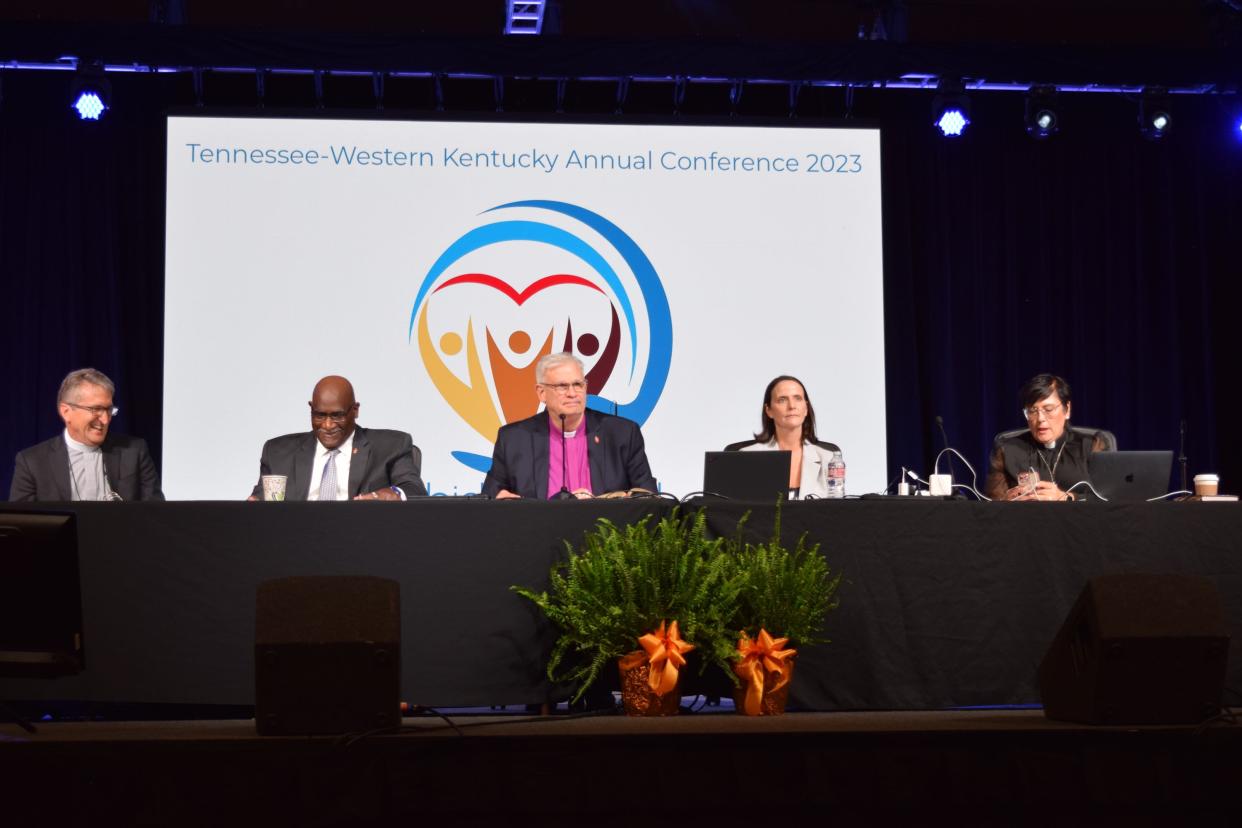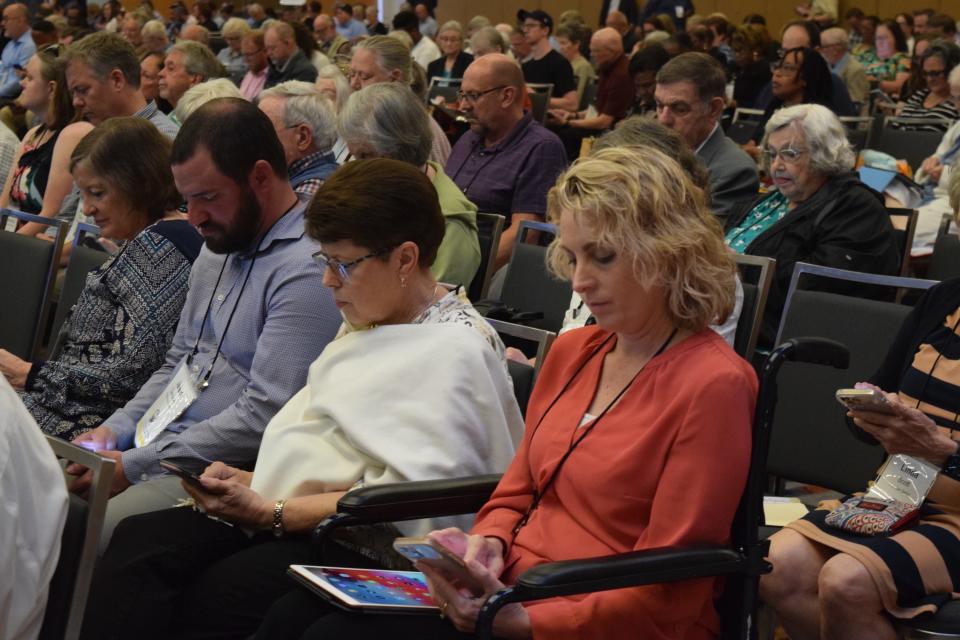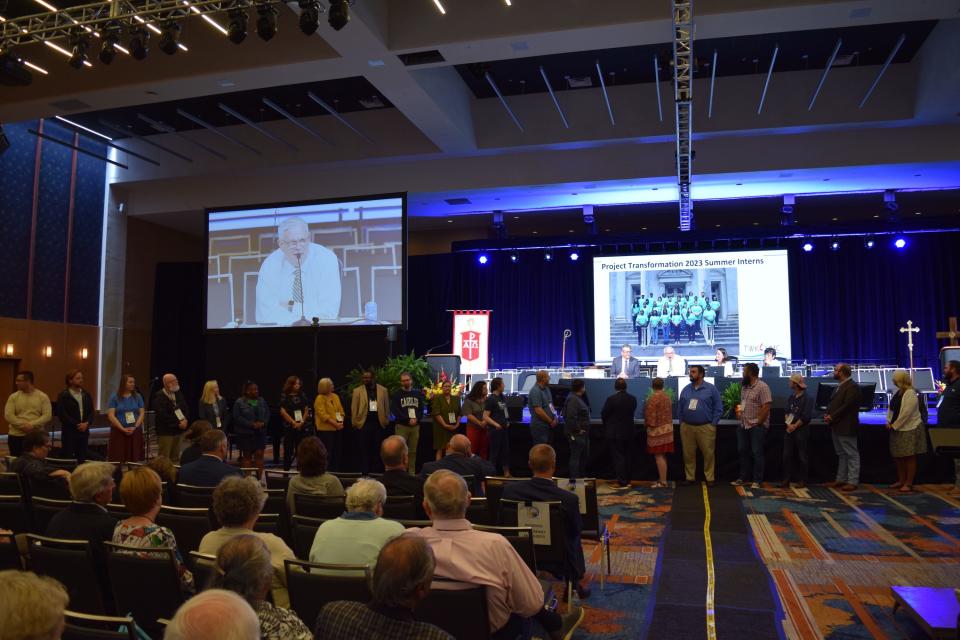Tennessee United Methodists look to rebuild amid UMC splintering, disaffiliating churches

Facing national tides of shrinking congregations and denominational turmoil, Tennessee United Methodists are tightening their belt in some areas and expanding programs in others.
The Tennessee-Western Kentucky Conference of the United Methodist Church gathered for its annual meeting in Memphis on June 19-21, when delegates representing local churches and conference staff approved a conservative budget for next year and discussed a new church model for congregants displaced by a wave of churches leaving the UMC, or disaffiliating.
“There’s no dividing line between age differentiation in these various denominations that are coming around,” said Bishop Bill McAlilly, who oversees the Tennessee-Western Kentucky Conference, at the recent meeting at Renasant Convention Center in Memphis. “No matter which side of the house you land on, you’re still going to need to be evangelizing and seeing the people nobody else sees and invite them in.”
The Tennessee-Western Kentucky Conference, or the regional authority for Middle and West Tennessee, has lost 222 churches this year and last due to disaffiliations as part of a splintering in the UMC.
Other recent UMC news/deep dive: Why the debate on whether to leave can be more intense among suburban UMC churches
East Tennessee UMC disaffiliations: Amid national wave, 264 East Tennessee and Virginia churches leave UMC following vote
Though more disaffiliations are expected this fall, the conference is already bent on bouncing back. Vital to that mission is The Vine UMC, a new hybrid-style church that includes in-person gatherings and remote worship online
“The need to launch a new community of faith that not only provides a home for those who are not only experiencing disaffiliation but offers all people who seek genuine connection outside standard church experience a new avenue for faithful discipleship and service,” said the Rev. Jefferson Furtado, lead pastor of The Vine, at the annual meeting.
The Vine is designed for churchgoers who are absent a home church, many of their own volition due to disaffiliation. Others might be seeking a church for the first time and want something with a more flexible structure, such as young professionals.
Furtado said 200 people have already joined or expressed interest in joining The Vine since it launched in April, which was right before Tennessee-Western Kentucky Conference delegates ratified disaffiliations for 162 congregations.
Altogether, more than 6,100 churches have disaffiliated from the UMC since 2019, meaning the churches completed a process that allows them to retain ownership of their property in exchange for an exit fee. Many of the disaffiliated churches are joining a more conservative breakaway denomination called the Global Methodist Church following disagreements over theology and church policy, including dealing with LGBTQ rights.
The Vine is “a community that invites questions and doubts, a community that celebrates diversity and holds love and justice at the center of its being,” said Furtado at the Tennessee-Western Kentucky Conference annual meeting.
Other regional UMC bodies, called annual conferences, are employing similar models to the Tennessee-Western Kentucky Conference. Meanwhile, the conference is pursuing other community revitalization opportunities. A recent success story is a merger between Memphis congregations First UMC and Bluff City Church in April.
Memphis UMC churches merger: In a time of division, two United Methodist Churches become one in Memphis
Broader disputes in the UMC played out at the Tennnessee-Western Kentucky Conference meeting. Delegates passed a resolution calling on anyone who intends to disaffiliate from the UMC to recuse themselves from any leadership roles in the denomination.
The resolution, which received 65% support, reflects a pro-UMC and anti-disaffiliation sentiment. The same delegates behind that resolution, many of whom clergy from Nashville, proposed other resolutions affirming LGBTQ clergy and denouncing discrimination in the UMC. Conference leadership, however, ruled those other resolutions out of order.

The Global Methodist Church launched transitional conference advisory teams in recent months for the new Mississippi-West Tennessee and Mid-South provisional conferences to serve Tennessee-based churches joining the denomination.
Necessary budget reductions
As the Tennessee-Western Kentucky Conference responds to disaffiliations by adding programs, it subtracted elsewhere.
The conference's total projected revenue loss between 2021-2024 is $3.5 million, explained John Pearce, who chairs the conference’s council on finance and administration.
“Together we need to develop new and creative ways to accomplish effective ministry with less financial resources and fewer paid employees,” Pearce said.

Disaffiliations contribute to the projected revenue loss, though other factors play a part, such as closures of shrinking churches and larger economic trends.
Payments, or apportionments, from the 162 churches in the Tennessee-Western Kentucky Conference that disaffiliated in May comprised 10% of last year’s total apportionment revenue. Those departures will affect the conference’s bottom line in future years, but their exit fee as part of their disaffiliation agreement includes apportionment payments for 12 months following their disaffiliation.
To disaffiliate, those 162 churches paid a total of $3.9 million in unfunded pension liability and another $3.1 million in apportionment-related exit fees. The conference will put some of that money to a new “Stay UMC Fund” to help the conference with trauma response, strategic planning, and resolving property issues.
Understanding UMC property disputes: Splinter explainer: Why church property plays major role in split of United Methodist Church
Conference delegates ultimately approved the recommended budget for next year, including a notable expenditure reduction in staffing for campus ministries at Belmont University, Fisk University, Vanderbilt University and the University of Tennessee Southern. Those campus ministries, rather than a designated staff person leading the group on campus, will transition to a new model based on partnerships with nearby churches.
The campus ministry reductions spurred debate at the conference’s annual meeting, with opponents pointing out the conference approved similar reductions last year for this year’s budget. Other delegates pushed back, saying they also support campus ministry but described the reductions as a fair compromise given the circumstances.
“These changing realities are now upon us, and a new path is necessary,” said Bethany Huffman, chair of the conference’s Equip Strategy Team, which oversees various ministries, at the annual meeting.
The same conversation is happening throughout the UMC.
The General Council on Finance and Administration, a Nashville-based UMC general agency that oversees the denomination's finances at the international level, announced in May it’s expecting a 40% reduction in the denomination’s 2025-2028 budget, according to United Methodist News. The UMC General Conference will vote on that budget and other major legislation at its meeting next April.
Liam Adams covers religion for The Tennessean. Reach him at ladams@tennessean.com or on Twitter @liamsadams.
This article originally appeared on Nashville Tennessean: Tennessee United Methodists look to rebuild amid UMC splintering

